
Sulphur is a city in Calcasieu Parish, Louisiana, United States. The population was 21,809 in 2020. Sulphur is part of the Lake Charles metropolitan statistical area.

An oil refinery or petroleum refinery is an industrial process plant where petroleum is transformed and refined into useful products such as gasoline (petrol), diesel fuel, asphalt base, fuel oils, heating oil, kerosene, liquefied petroleum gas and petroleum naphtha. Petrochemical feedstock like ethylene and propylene can also be produced directly by cracking crude oil without the need of using refined products of crude oil such as naphtha. The crude oil feedstock has typically been processed by an oil production plant. There is usually an oil depot at or near an oil refinery for the storage of incoming crude oil feedstock as well as bulk liquid products. In 2020, the total capacity of global refineries for crude oil was about 101.2 million barrels per day.

Cancer Alley is the regional nickname given to an 85-mile (137 km) stretch of land along the Mississippi River between Baton Rouge and New Orleans, in the River Parishes of Louisiana, which contains over 200 petrochemical plants and refineries. This area accounts for 25% of the petrochemical production in the United States. Environmentalists consider the region a sacrifice zone where rates of cancer caused by air pollution exceed the federal government's own limits of acceptable risk. Others have referred to the same region as "Death Alley".
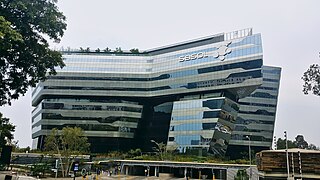
Sasol Limited is an integrated energy and chemical company based in Sandton, South Africa. The company was formed in 1950 in Sasolburg, South Africa, and built on processes that German chemists and engineers first developed in the early 1900s. Today, Sasol develops and commercializes technologies, including synthetic fuel technologies, and produces different liquid fuels, chemicals, coal tar, and electricity.

A bioindicator is any species or group of species whose function, population, or status can reveal the qualitative status of the environment. The most common indicator species are animals. For example, copepods and other small water crustaceans that are present in many water bodies can be monitored for changes that may indicate a problem within their ecosystem. Bioindicators can tell us about the cumulative effects of different pollutants in the ecosystem and about how long a problem may have been present, which physical and chemical testing cannot.

The Bay of Haifa or Haifa Bay, formerly Bay of Acre, is a bay along the Mediterranean coast of Northern Israel. Haifa Bay is Israel's only natural harbor on the Mediterranean.

Bayway Refinery is a refining facility in the Port of New York and New Jersey, owned by Phillips 66. Located in Linden and Elizabeth, New Jersey, and bisected by Morses Creek, it is the northernmost refinery on the East Coast of the United States. The oil refinery converts crude oil into gasoline, diesel fuel, jet fuel, propane and heating oil. As of 2007, the facility processed approximately 238,000 bbl/d (37,800 m3/d) of crude oil, producing 145,000 bbl/d (23,100 m3/d) of gasoline and 110,000 bbl/d (17,000 m3/d) of distillates. Its products are delivered to East Coast customers via pipeline transport, barges, railcars and tank trucks.
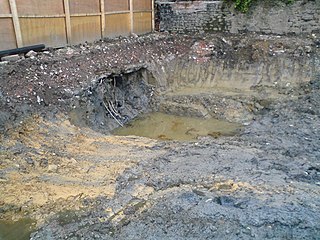
Soil contamination, soil pollution, or land pollution as a part of land degradation is caused by the presence of xenobiotic (human-made) chemicals or other alteration in the natural soil environment. It is typically caused by industrial activity, agricultural chemicals or improper disposal of waste. The most common chemicals involved are petroleum hydrocarbons, polynuclear aromatic hydrocarbons, solvents, pesticides, lead, and other heavy metals. Contamination is correlated with the degree of industrialization and intensity of chemical substance. The concern over soil contamination stems primarily from health risks, from direct contact with the contaminated soil, vapour from the contaminants, or from secondary contamination of water supplies within and underlying the soil. Mapping of contaminated soil sites and the resulting cleanups are time-consuming and expensive tasks, and require expertise in geology, hydrology, chemistry, computer modeling, and GIS in Environmental Contamination, as well as an appreciation of the history of industrial chemistry.

The Ministry of Environment is the South Korea branch of government charged with environmental protection. In addition to enforcing regulations and sponsoring ecological research, the Ministry manages the national parks of South Korea. Its headquarters is in Sejong City.

Blue Vinyl is a 2002 documentary film directed by Daniel B. Gold and Judith Helfand. With a lighthearted tone, the film follows one woman's quest for an environmentally sound cladding for her parents' house in Merrick, Long Island, New York. It also investigates the many negative health effects of polyvinyl chloride in its production, use and disposal, focusing on the communities of Lake Charles and Mossville, Louisiana, and Venice, Italy. Filming for Blue Vinyl began in 1994. It was aired on HBO as part of the series America Undercover.
Rubbertown is a neighborhood of Louisville, Kentucky, located along the Ohio River. During World War II, it became the home of many industrial plants which remained after the war and led to its name. Its largest businesses include American Synthetic Rubber, Borden Chemical, DuPont Dow Elastomers, Noveon, Dow Chemical, and Zeon Chemicals.
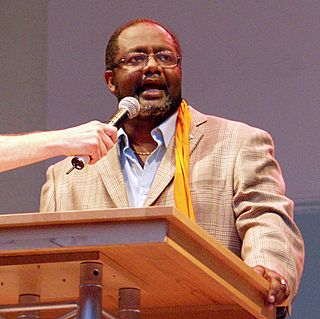
Jerome C. Ringo is an environmental justice, clean energy, and quality jobs advocate who founded and chairs renewable energy developer Zoetic Global.
Mossville is a small, predominantly African American unincorporated community on the outskirts of Lake Charles in Calcasieu Parish, Louisiana, United States. It is part of the Lake Charles Metropolitan Statistical Area and is sandwiched between the much larger and predominantly white towns of Sulphur to the west and Westlake to the east.
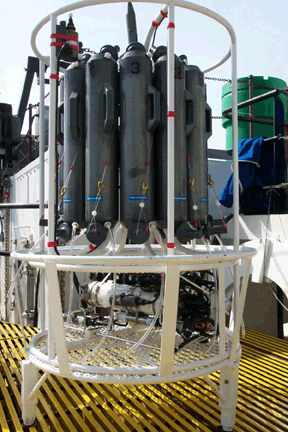
Environmental monitoring describes the processes and activities that need to take place to characterize and monitor the quality of the environment. Environmental monitoring is used in the preparation of environmental impact assessments, as well as in many circumstances in which human activities carry a risk of harmful effects on the natural environment. All monitoring strategies and programs have reasons and justifications which are often designed to establish the current status of an environment or to establish trends in environmental parameters. In all cases, the results of monitoring will be reviewed, analyzed statistically, and published. The design of a monitoring program must therefore have regard to the final use of the data before monitoring starts.
The Shell plant explosion in Norco, Louisiana refers to two explosions that occurred in the community in 1973 and 1988. The incident in 1973 occurred when a sixteen-year-old, Leroy Jones, was cutting grass for Helen Washington, who was taking a nap on her porch in the Diamond community. The plant released a plume of gas. A spark from the lawnmower ignited the plume of gas and the flames that resulted engulfed Leroy Jones and Helen Washington. The second explosion occurred in 1988. An early morning explosion from the plant killed seven Shell workers, destroyed homes in the Diamond community, and released 159 million pounds (72 kt) of chemical waste into the atmosphere. Residents still suffer from early illnesses and deaths as a result of the toxic fumes. Citizens have fought Shell Oil since the 1973 explosion. On June 11, 2002, the Concerned Citizens of Norco finished open discussions and negotiations with Shell Oil. The settlement created two programs, the Property Purchase Program and the Home Improvement Program. These programs allow the citizens to either sell their property to Shell at fair price or benefit from programs aimed at improving the Diamond community.
VOC BioTreat™ is a U.S. patent pending technology for Ramboll Environ.

PTT Global Chemical, also known as PTTGC, is a petrochemical company that specializes in synthesizing olefins and aromatics. It was founded in 2011 and is a subsidiary of PTT Public Company Limited.
Toxic hotspots are locations where emissions from specific sources such as water or air pollution may expose local populations to elevated health risks, such as cancer. These emissions contribute to cumulative health risks of emissions from other sources nearby. Urban, highly populated areas around pollutant emitters such as old factories and waste storage sites are often toxic hotspots.
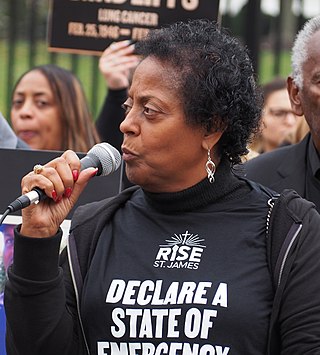
Sharon Lavigne is an environmental justice activist in Louisiana focused on combating petrochemical complexes in Cancer Alley. She is the 2022 recipient of the Laetare Medal, the highest honor for American Catholics, and a 2021 recipient of the Goldman Environmental Prize.
Mossville: When Great Trees Fall is a 2019 feature-length documentary film directed by Alexander Glustrom.














